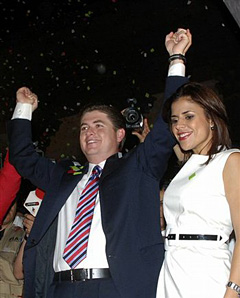
|  |  |  News Around the Republic of Mexico | July 2009 News Around the Republic of Mexico | July 2009  
Old Ruling Party Gains in Mexico Midterm Election
 Mark Stevenson & Michael E. Miller - Associated Press Mark Stevenson & Michael E. Miller - Associated Press
go to original
July 06, 2009


| | Rodrigo Medina, left, of the Institutional Revolutionary Party, PRI, celebrates alongside his wife, Gretta Salinas, in Monterrey, Sunday, July 5, 2009, after being named the projected winner in gubernatorial elections in Mexico's northern state of Nuevo Leon. The party that ruled Mexico for seven decades appeared to be making a historic comeback in Sunday's midterm congressional elections, scoring big with voters for the first time since it lost the presidency in 2000. (AP) |  |
Mexico City — Reviled as a creaky remnant of Mexico's authoritarian past, the old Institutional Revolutionary Party made a big comeback in midterm elections, once again becoming the largest force in Congress.

Still the country's biggest and most representative party, the PRI now presents itself as an underdog chastened and improving after its loss of the presidency in 2000.

One PRI campaign ad challenged the naysayers by showing a sure-footed soccer player who sinks a penalty shot even as the home-team crowd whispers, "He's going to miss it." The slogan: "PRI, proven experience, new attitude."

The PRI seemed to be dying when it lost its decades-long hold on power. Staff went unpaid and visitors to the cavernous PRI headquarters scouted party emblems as historical souvenirs.

Now that the party can work with allies to achieve an absolute majority in Congress, it could pose problems for President Felipe Calderon and his ruling National Action Party, which ran a bruising ad campaign depicting the PRI as complicit in the drug trade.

Calderon mounted a nationwide offensive against drug cartels after taking office in December 2006, but the bodies of gang-violence victims continue to pile up. The world economic slide has hit Mexico hard, too, with the economy expected to shrink 5.5 percent this year, its worst economic downtown since the 1990s.

Calderon urged the new Congress to work together. "The competition is behind us, and now we have to focus our efforts on seeking the agreements the country needs to recover, as soon as possible, economic growth, job creation and public safety," Calderon said.

But PRI leader Beatriz Paredes considers Sunday's electoral victory to be a vindication.

"The results demonstrate that Mexico is a country that wants proposals, that Mexico is a country that wants solutions, that Mexico is a country that won't tolerate insults," Paredes said.

With 97 percent of the votes counted Monday, the PRI was winning about 37 percent of votes for Congress, to about 28 percent for President Felipe Calderon's conservative National Action Party, the PAN.

The former ruling party also held leads in at least four of six governorship races, including the border state of Nuevo Leon.

Meanwhile, the leftist Democratic Revolutionary Party, or PRD, had its worst showing in 18 years. Since almost winning the presidency in 2006, the party has splintered amid infighting, dropping to around 12 percent of the vote compared to 29 percent in 2006 and leaving the field open for the PRI.

Sunday's vote reduced the PAN's strength to what it had before capturing the presidency in 2000. The PAN will lose some of its 206 seats in the lower house, and the PRI stands to more than double its 106 seats.

"The PRI today is a different concept than the PRI that governed for 70 years. That PRI died in 2000," said pollster Maria de las Heras, noting the party has become more fractious and divided between regional interests than it was when the all-powerful, unquestioned president – invariably a PRI member – ran both the country and the party.

"The elections weren't run by the national party leadership; they were run by 17 state governors," opening the potential for internal and legislative paralysis as leading PRI governors jockey for the 2012 presidential nomination, she said.

The question now becomes which PRI member comes out on top. Early polls have favored the young governor of Mexico state, Enrique Pena Nieto, who has often been featured on the covers of society magazines.

It is doubtful that the PRI will pull together with Calderon. Despite the bruising ads about drug trafficking, candidates most tarred by alleged connections to cartels were winning their races.

The PAN's own candidate for a wealthy suburb of Monterrey appeared far ahead, despite off-the-cuff comments acknowledging traffickers live in his town. And the PRI candidate for the governorship of western Colima state was well ahead, despite having relatives linked to the drug trade.

Calderon's party appeared to have won the northern border state of Sonora from the PRI.

De las Heras said Calderon could face a long stretch as a lame duck – "The race for 2012 is already on."

Associated Press Writer Nacha Cattan contributed to this report. |

 |
|  |



